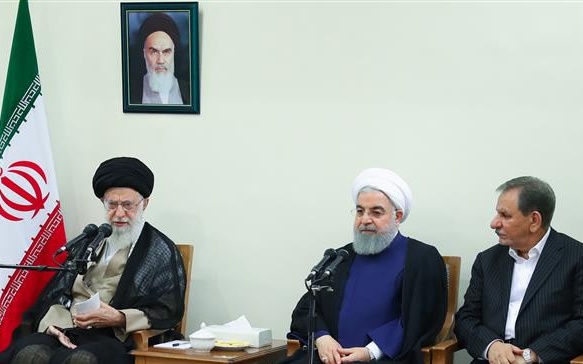Iran’s President Hassan Rouhani (C) with the Supreme Leader (L) and 1st Vice President Esh’aq Jahangiri (R)
Facing both political pressure and crisis in Iran’s economy, President Hassan Rouhani has stepped up his criticism of the US while assuring Iranians that all will be well.
In a speech on Saturday, Rouhani proclaimed, “Perseverance, Resistance” as he insisted that the US is “more and more isolated” after its May 8 withdrawal from the July 2015 nuclear deal and expansion of sanctions.
Rouhani declared, “The illegal logic of the United States is not supported by any international organizations.”
He then asserted that Iran was successfully challenging the restrictions by developing links around the world, “We are very hopeful that the trend of economic engagement with the world will continue as before.”
In contrast to the President’s rhetoric, Iran has struggled to maintain essential trade and investment with the Trump Administration threatening punishment of any foreign company with US links that does business with Tehran after November 4.
Major firms that have suspended links include France’s oil giant Total, French auto manufacturer PSA, German conglomerate Siemens, and the world’s largest shipper Maersk.
With refiners, shippers, and insurers pulling back from movement of Iranian oil, Tehran’s exports are already down 16% since June 1 and are projected to fall 40% from the post-agreement high of around 2.5 million barrels per day.
Amid the contracting economy and uncertainty, the Iranian currency — which was already at a historically low level — has fallen about 40% vs. the US dollar since January.
But Rouhani insisted, “Regarding energy, transportation, basic commodities and production, our country will face no problems and we have always been victorious when the government and the people have stood together.”
He said the Government had sufficient foreign currency to meet people’s needs and claimed that the sharp devaluation as well as restrictions on imports meant “better opportunities” for producers and exporters.
He concluded, “Today, we can confront the plots of our enemies and continue our path more powerful than yesterday, and I assure people that despite some pressures, we can manage the lives of people in the country with the support of the people and get through the problems well.”
—
While Rouhani’s assertions may mean little economically, they continued to push back hardline pressure which had threatened his position.
After the reappearance of protests in the Tehran Bazaar and in markets in other cities, the Supreme Leader’s office and allies stepped up warning to the President, even declaring that Iran might be better off with no Government rather than Rouhani’s.
Rouhani bent to the pressure with a tougher line against Washington. His Saturday statement brought an immediate reward yesterday with a show of support from the Supreme Leader.
Meeting the President and his Cabinet, Ayatollah Khamenei said, “I strongly believe that, if the government takes the necessary measures, it will be able to overcome problems and defeat the U.S. conspiracy.”
He expressed faith in an approach in which “the country’s relations with the East and the West should be increasingly enhanced”.
At the same time, in an implicit acknowledgement of the difficulties in confirming European links, he said, “The European sides are obligated to provide necessary guarantees with regard to the JCPOA [nuclear deal], but the country’s economy must not be tied to this issue.”

